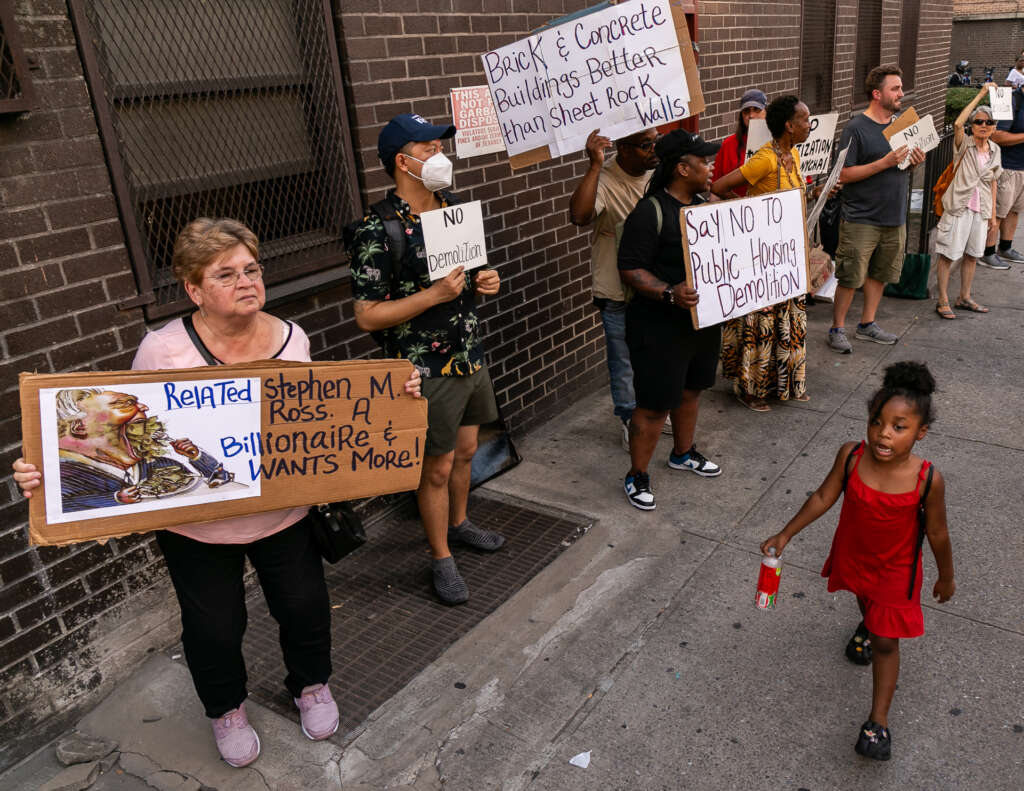The public has until May 19 to submit feedback on a proposal to demolish and rebuild NYCHA’s Fulton and Elliott-Chelsea Houses under the PACT program, which would also construct thousands of mixed-income—including market-rate—apartments at the Manhattan campuses.
Residents protesting the demolition/rebuild plan outside the Fulton Community Center in September 2023. (Photo by Adi Talwar)
The public is getting additional time to weigh in on NYCHA’s controversial plan to demolish and rebuild the Fulton and Elliott-Chelsea Houses in Manhattan.
NYCHA and the city’s Department of Housing, Preservation and Development (HPD) will now accept written and online feedback on the proposal through May 19, part of a required 45-day comment period on the Draft Environmental Impact Statement (DEIS) for the plan, which officials released at the end of March. Public comments will be incorporated into a final Environmental Impact Statement, according to NYCHA, which examines “both short-term and long-term effects of a proposed project and considers possible measures to reduce or mitigate those effects.”
The massive DEIS document is the latest step in a years-long and divisive debate over plans for NYCHA’s Fulton, Elliott, Chelsea, and Chelsea Addition Houses in lower Manhattan. The campuses were selected for overhauls as part of NYCHA’s Permanent Affordability Commitment Together (PACT) initiative, which transfers public housing sites from the cash-strapped federal Section 9 program to the more lucrative Section 8, and brings in private developers to carry out repairs and take over daily management.
While most PACT projects focus on repairing properties, NYCHA is seeking to demolish all 2,056 existing apartments at Fulton and Elliott-Chelsea and replace them “brand-new, enhanced homes.” The construction, to be carried out by real estate companies Essence Development and Related, would take place in phases, with the majority of public housing tenants remaining in their current apartments as the new towers go up.
The proposal would also build 3,454 new mixed-income units on the campuses, approximately 875 of which would be affordable apartments. The remaining market rate units “would financially support the PACT and affordable housing components,” according to the DEIS.
NYCHA held a series of recent public hearings as part of the environmental review for the plan, which drew protests from those opposed to demolition as well as testimony from those in favor.
Those in the former camp have cited concerns about the involvement of private developers in public housing and the creation of market-rate units at the sites, as well as the disruption that ongoing construction could have on the community. NYCHA tenants are expected to begin moving into the first set of new buildings at the end of 2028, according to the proposal, while the mixed-income apartments—to be built after the new NYCHA towers are done—are expected to wrap around 2040.
NYCHA has said the majority of tenants, 94 percent, will stay in their current homes until their new building is complete. But residents in two buildings will need to relocate temporarily while construction is underway, and will sign a “Right to Return Agreement” that guarantees them the right to return to their campus once the replacement properties are built.
Still, fears of displacement persist.
“If you insist on catering to the private developers and the real estate department in NYCHA, it would be demolition against our will,” Celines Miranda, an Elliott Houses tenant, testified during a virtual hearing Thursday night. “I surely do not want to live in ground zero of a construction zone, and let’s keep it real—many of us will not be here when this demolition ends.”
She and others say the existing properties should be rehabbed rather than torn down and rebuilt. But NYCHA says the current buildings have been assessed as having “extensive, advanced deterioration that would increase the cost of a renovation project.” Officials also point to a 2023 resident survey in which the majority of respondents opted for a complete rebuild (though a number of tenants have criticized that survey as misleading).
The Fulton Houses’ Senior Center at 119 9th Ave. (Photo by Adi Talwar)
Those who support the demolition plan said they’re excited by the prospect of brand-new apartments. Government funding for Section 9 is extremely limited, meaning NYCHA has few resources to address its ailing housing stock and make repairs to issues tenants are dealing with now.
“We’re in a place where our buildings are crumbling. We’re actually a spectacle to the tourists that come by. They walk by our buildings and stare,” Irene O’Connell testified at Thursday’s hearing, identifying herself as a longtime Fulton Houses resident.
Another Fulton Houses tenant who spoke during the hearing described living in an apartment with her children “that has been overrun by mice since 2021” and where she had no electricity in her son’s bedroom for over a year.
“Just two days ago I was woken up when three mice were fighting and pounced on the top of my head in the middle of the night. I’m living in deplorable conditions, and I would invite any of these people that are so opposed to the rebuild and so opposed to seeing our family’s side, to just come to my apartment,” the woman said.
“I look forward to having a washing machine and a dryer, a dishwasher, and safer living conditions,” she continued. “If you needed a heart transplant, would you sit there and accept a very old pacemaker instead? No, you would want a full, brand new heart so that you could thrive.”
To reach the editor, contact Jeanmarie@citylimits.org
Want to republish this story? Find City Limits’ reprint policy here.
The post WEIGH IN: Deadline for Comments on NYCHA’s Fulton and Elliott-Chelsea Plan Extended to 5/19 appeared first on City Limits.

